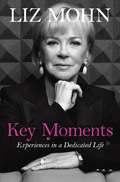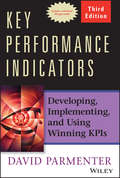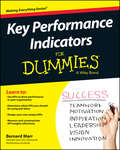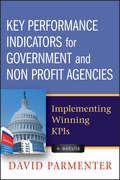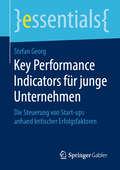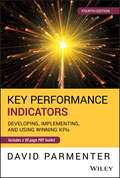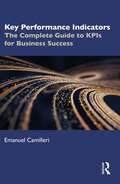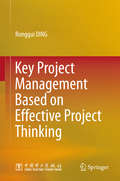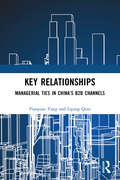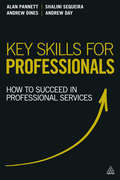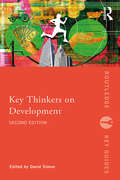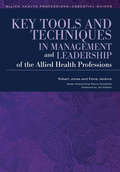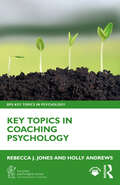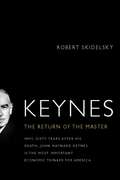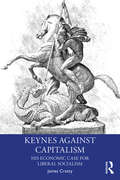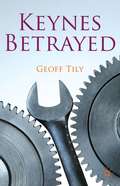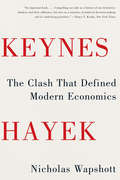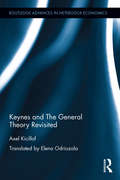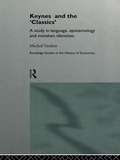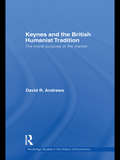- Table View
- List View
Key Moments: Experiences in a Dedicated Life
by Liz Mohn"You always saw the world as your workplace."In 2009, this was how Reinhard Mohn--the man who turned Bertelsmann AG from an unremarkable, postwar German business into a successful, international media conglomerate--described the professional dedication of his wife, Liz Mohn. Born into a seemingly hopeless world, this girl from Wiedenbrück, Germany, grew into a proactive woman who, following her late husband's death, now represents the fifth generation of Bertelsmann's ownership. She sits on the company's supervisory board, where for decades she has brought unconventional ideas to a traditional media empire, and she also serves as vice chairwoman of the Bertelsmann Foundation's executive board. In her new book, Key Moments, Mohn tells her remarkable personal history, recalling with great candor the difficult early years in Gütersloh and how she grew into her role at the side of her influential husband. She met challenges with curiosity and a desire to learn from her mistakes. Through it all, she followed her life's motto: Try it. You can do it. An active philanthropist, Mohn highlights the importance of every individual being accountable to a greater good while appealing to the social responsibility of the political and economic sectors as well. She makes the case that each of us is called to contribute his or her part toward creating a successful future. This, of course, is what Liz Mohn has done all of her life. In light of her efforts and successes, she is often asked, "How do you do it all?" Key Moments gives readers a fascinating insight into the answer.
Key Performance Indicators (KPI)
by David ParmenterAn in-depth look at how to create and use key performance indicators (KPIs), from the King of KPIs - now updated and expanded!By exploring measures that have transformed businesses, David Parmenter has developed a methodology that is breathtaking in its simplicity and yet profound in its impact. Now in an updated and expanded Second Edition, Key Performance Indicators is a proactive guide representing a significant shift in the way KPIs are developed and used, with an abundance of implementation tools, including:The four foundation stones that lead the development and use of KPIsA 12-step model for developing and using KPIs with guidelines A KPI resource kit including worksheets, workshop programs, and questionnairesA new and pragmatic approach to finding critical success factorsOver 300 performance measuresImplementation variations for small to medium enterprises and not-for-profit organizationsNew implementation short cutsHow to brainstorm performance measuresTemplates for reporting performance measuresA resource kit for a consultant who is acting as a coach / facilitator to the in-house project teamNow including a discussion of critical success factors, as well as new chapters that focus on implementations issues and 'how to sections' on finding your CSFs and brainstorming the performance measures that report progress within the CSFs, Key Performance Indicators, Second Edition will help you identify and track your organization's KPIs to ensure continued and increased success.
Key Performance Indicators For Dummies
by Bernard MarrA complete guide to using KPIs to drive organisational performance Is your business on track to achieve success? Key Performance Indicators For Dummies covers the essential KPIs that are useful to all kinds of businesses, and includes more than 100 different ways leaders can monitor and drive performance in their organisations. This book helps managers understand the crucial KPIs that should be implemented for all different aspects of the organisation, including financial performance, operational and internal processes, sales and marketing, customer satisfaction and more. Good KPIs should be unique to every business, as every business has different objectives. To meet this need, the book provides tools and templates that leaders can use to develop unique KPIs that best suit their particular organisation or industry. Learn to design KPIs that are unique to your business and fit closely to your strategic objectives Determine which KPI questions you should be asking to achieve the right insights for your business Learn the specific KPIs that are appropriate for different business circumstances Turn KPIs into deep insights by mastering related reporting and communications practices KPIs are a crucial part of every manager's toolkit, and are essential for helping to monitor the execution of business strategies and measure results. Key Performance Indicators For Dummies moves beyond a basic discussion of what KPIs are, and why they are needed to provide a complete guide for learning to design and use specific KPIs to drive organisational performance.
Key Performance Indicators for Government and Non Profit Agencies
by David ParmenterWinning techniques and strategies for nonprofits and government agencies in creating successful and critical key performance indicatorsBy exploring measures that have transformed businesses, David Parmenter has developed a methodology that is breathtaking in its simplicity and yet profound in its impact. Key Performance Indicators for Government and Nonprofit Agencies: Implementing Winning KPIs is a proactive guide representing a significant shift in the way KPIs are developed and used, with an abundance of implementation tools for government agencies and nonprofit groups.Implementation variations and short cuts for government and not-for-profit organizationsHow to brainstorm performance measuresTemplates for reporting performance measuresA resource kit for a consultant who is acting as a coach / facilitator to the in-house project teamAlso by David Parmenter: Key Performance Indicators: Developing, Implementing, and Using Winning KPIs, Second EditionFilled with numerous case studies and checklists to help readers develop their KPIs, this book shows government agencies and nonprofits how to select and implement winning key performance indicators to ensure that their performance management initiatives are successful.
Key Performance Indicators für junge Unternehmen: Die Steuerung von Start-ups anhand kritischer Erfolgsfaktoren (essentials)
by Stefan GeorgWer über geeignete Kennzahlen verfügt, kann für das eigene Geschäftsmodell zu jedem Zeitpunkt Chancen, Risiken und den laufenden Kapitalbedarf ermitteln. Der wesentliche Unterschied zwischen etablierten und jungen Unternehmen im Bereich Controlling besteht darin, dass reife Unternehmen ein Kennzahlensystem auf Erfahrungen aufgebaut haben, während Start-ups zunächst die Hypothesen des Businessplans nach und nach validieren oder falsifizieren müssen. Sie brauchen Kennzahlen, sogenannte Key Performance Indicators (KPI), die die kritischen Erfolgsfaktoren des Unternehmens analysieren. Zielsetzung des vorliegenden Buches ist es, eine Handlungsanleitung für Start-ups zu entwickeln, die zeigt, welche KPIs so nutzbringend wie möglich und mit möglichst geringem Aufwand in den Phasen des Start-ups eingesetzt werden können.
Key Performance Indicators: Developing, Implementing, and Using Winning KPIs
by David ParmenterThe new edition of the bestselling guide on creating and using key performance indicators—offers significant new and revised content Key Performance Indicators (KPIs) help define and measure the organizational goals which are fundamental to an organization’s current and future success. Having solid KPIs is crucial for companies that are implementing performance management systems, such as balanced scorecards, six sigma, or activity-based management. In many organizations, KPIs are often too numerous, randomly assembled, and overly complex—essentially rendering them ineffectual, or at worse, counterproductive. Key Performance Indicators provides a model for simplifying the complex areas of KPIs while helping organizations avoid common mistakes and hazards. Now in its fourth edition, this bestselling guide has been extensively revised and updated to incorporate practical lessons drawn from major implementations. Fresh content includes a more concise KPI methodology with clear implementation guidance, original insights on how other areas of performance management can be corrected, and new in-depth case studies. A revised starter kit is included to identify critical success factors, and the KPI resource kit contains updated worksheets, workshop programs, and questionnaires. Helping readers to better define and measure progress toward goals, this important guide: Dispels the myths of performance measurement and explains a simple, yet powerful KPI methodology Explains the 12-step model for developing and using KPIs with guidelines Helps readers brainstorm performance measures, sell KPI projects to the Board and senior management, and accurately report performance Features the “KPI Project Leaders Corner” which provides readers with essential information and useful exercises Includes an array of practical tools—templates, checklists, performance measures—and a companion website (www.davidparmenter.com) Key Performance Indicators: Developing, Implementing, and Using Winning KPIs, 4th Edition is important resource for C-suite executives, senior management, project teams, external project facilitators, and team coordinators involved in all aspects of performance management systems.
Key Performance Indicators: The Complete Guide to KPIs for Business Success
by Emanuel CamilleriKey performance indicators (KPIs) are widely used across organisations. But are they fully understood in how they can properly shape, improve, or even undermine organisational systems and outcomes? This book presents a framework and tools for measuring and managing performance at various levels within an organisation, and helps managers re-think the ways KPIs can be implemented to meet organisational goals.Innovative performance measurement and management is a vital function within any organisation irrespective of its size and industry. Measuring and managing performance (whether on an individual, team, or departmental basis) assists management in calibrating their established strategic goals by providing an insight into how well their employees and the organisation are doing and identifying areas of concern for rectification and improvement. This book focuses on the practicality of performance management tools (for example, Performance Analytics; Performance Reporting; Critical Success Factors; Balanced Scorecard; Benchmarking; Six Sigma; Business Excellence Models; Enterprise Risk Management) and illustrates their use, and the changing nature of how organisational performance will be evaluated in the future. This includes the application of Artificial Intelligence as an important trend in performance measurement and management.This book provides a universal framework for implementing a performance measurement and management system that is applicable to both the private and public sectors. It is particularly relevant to HR and operational managers, and organisational leaders and public administrators at all levels.
Key Project Management Based on Effective Project Thinking
by Ronggui DingThis book provides an effective overall approach and concrete action strategies to help readers quickly grasp key aspects of project management and reduce the pressure during the learning process, so that they can soon start enjoying the fruits of successful project management. The problems discussed in this book have been drawn both from several years of theoretical research on the part of the author, and from communications between the author and hundreds of business executives and project managers from many domestic and international EMBA and CEO classes. The book's unique content is written in an easy-to-follow tone with typical Chinese systemic and dialectical thinking, intended to help readers find the appropriate way to solve problems as they encounter them. One of the popular misunderstandings about project management is to make project managers to take most of the responsibilities for project success, i. e. senior managers in companies usually think project management is not their business. This book puts project management in business context to eliminate this misunderstanding and demonstrates that: only if the senior managers recognize the value of projects and play their roles in project governance and project management right, their companies can survive and develop in the changing society. In order to solve the contradiction between the uniqueness of a project and the efficiency/reliability of its management, this book examines, based on Chinese dial ectical logic, the basic preparation needed for successful project management, including how to use unified principles to manage projects with different characteristics, how to create company-wide project governance infrastructure to make project managers to be able to take their management responsibilities, and how to establish effective relationships among project stakeholders to make unique projects to be manageable structured partner social networks, etc. This book explains how to deal with the key contradictions existing in each phase of a project, from project decision-making to close-out. This book is basically for both top managers of companies and project managers, so it addresses many challenges companies and project managers will have to face in the changing society, and provides essential strategies and methods for overcoming them. This book is not an another book to talk about project management knowledge or successful project management stories, it is about basic project thinking and corresponding insights to deal with key common issues in projects, which are essential to manage projects and even companies reliably in the changing and unreliable society.
Key Relationships: Managerial Ties in China’s B2B Channels
by Pianpian Yang Liping QianThis book explores the governance and ramifications of managerial ties in China’s B2B contexts, with the aim of uncovering theoretical mechanisms and practical strategies for effective management of these relationships.In this book, managerial ties refer to personal relationships between corporate executives, business partners, and government or regulatory officials. While common in the Chinese business environment, these relationships are gaining recognition and value globally. Drawing on insights from four empirical studies, the authors focus on managerial ties within channel relationships among Chinese firms. The book analyzes how business and political ties affect channel outcomes, highlights the limitations of managerial ties in emerging markets, and identifies conditions or mechanisms that may lead to negative effects.This work will be valuable to researchers and students of business management and relationship marketing, as well as to business professionals interested in Chinese business practices and multinational companies operating in China.
Key Skills for Professionals
by Alan Pannett Shalini Sequeira Andrew Dines Andrew DayKey Skills for Professionals will help you to acquire and develop the key skills that will enable you to stand out as a consummate professional in a fiercely competitive environment - the world of professional services.The skills covered are applicable across all professions and are of use both to those qualifying for a profession and those already working in a professional services business. Through demonstrating and effectively implementing these skills, you will enhance your career progression. The authors make use of realistic and relevant case studies based on their knowledge, experience and expertise. There are also practical exercises, management exercises and tools for analysing self-awareness and communication styles and summaries with ideas for further reading.
Key Themes in Energy Management: A Compilation of Current Practices, Research Advances, and Future Opportunities (Lecture Notes in Energy #100)
by Akilu Yunusa-KaltungoThis book provides a comprehensive global coverage of energy management as it relates mostly to developing countries. In an era of unprecedented global population growth, the demand for energy has reached staggering levels. The United Nations reported an enormous 200% increase in population between 1950 and 2020, with projections indicating a further rise to 10.9 billion by 2100. As a direct consequence, global primary energy usage has surged from 3701 Mtoe in 1965 to 13511 Mtoe in 2017, putting immense strain on existing energy sources. If current growth rates persist, these sources could be depleted within a mere 130 years. To address this impending crisis, governments worldwide have implemented regulations and incentives to promote energy conservation. While numerous studies and publications have emerged within the field of energy management, there remains a significant research gap, particularly concerning the energy challenges faced by developing countries. Existing edited books on energy-related topics often narrowly focus on specific aspects, hindering readers from gaining a holistic understanding of energy management challenges and potential solutions. This book fills this void. Recognizing the pivotal role these nations play in achieving sustainable development goals, this book provides a wide-ranging perspective on the trends, challenges, and potential solutions to energy crises in these regions. It not only acknowledges the challenges faced by developing countries but also offers viable strategies to address them. The editor, leveraging his successful leadership experience in global academic endeavors, including publishing a book on Occupational Safety & Health practices during the COVID-19 era and coordination of multinational research projects, is well positioned to bring together exceptional chapters from various countries. His extensive network ensures the inclusion of diverse perspectives, enriching the book's content and offering invaluable insights to readers. Designed for a broad readership, including energy industry organizations, professionals, researchers, government bodies, policymakers, and students, this book delves into a wide array of energy management issues. By facilitating a comprehensive understanding of the subject, it equips readers with the knowledge and tools necessary to navigate the complex landscape of energy management in the modern world.
Key Thinkers on Development (Routledge Key Guides)
by David SimonSince its publication in 2006 as Fifty Key Thinkers on Development, this invaluable reference has established itself as the leading biographical handbook in its field, providing a concise and accessible introduction to the lives and key contributions of development thinkers from across the ideological and disciplinary spectrum. This substantially expanded and fully updated second edition in the relaunched series without the numerical constraint includes an additional 24 essays, filling in many gaps in the original selection, greatly improving the gender balance and diversifying coverage to reflect the evolving landscape of development in theory, policy and practice. It presents a unique guide to the lives, ideas and practices of leading contributors to the contested terrain of development studies and development policy and practice. Its thoughtful essays reflect the diversity of development in theory, policy and practice across time, space, disciplines and communities of practice. Accordingly, it challenges Western-centrism, Orientalism and the like, while also demonstrating the enduring appeal of "development" in different guises. David Simon has assembled a highly authoritative team of contributors from different backgrounds, regional settings and disciplines to reflect on the lives and contributions of leading authorities on development from around the world. These include: Modernisers like Kindleberger, Perroux and Rostow Dependencistas such as Frank, Furtado, Cardoso and Amin Progressives and critical modernists like Hirschman, Prebisch, Helleiner Sen, Streeten and Wang Political leaders enunciating radical alternative visions of development, such as Mao, Nkrumah and Nyerere Progenitors of religiously or spiritually inspired development, such as Gandhi, Ariyaratne and Vivekananda Development–environment thinkers like Agarwal, Blaikie, Brookfield, Ostrom and Sachs International institution builders like Singer, Hammarsköld, Kaul and Ul Haq Anti- and post-development thinkers and activists like Escobar, Ghosh, Quijano and Roy Key Thinkers on Development is therefore the essential handbook on the world’s most influential development thinkers and an invaluable guide for students of development and sustainability, policy-makers and practitioners seeking an accessible overview of this diverse field and its leading voices.
Key Tools and Techniques in Management and Leadership of the Allied Health Professions
by Robert Jones Fiona JenkinsThe Allied Health Professions - Essential Guides series is unique in providing advice on management, leadership and development for those in the Allied Health Professions (AHP). This highly practical volume offers a wide range of assessment tools and techniques in such critical areas as management quality, organisational and management structure, benchmarking, capacity and demand management, care pathway design, activity analysis, report writing and presentation skills. The layout is conducive to easy comprehension; tables, figures and boxed text aid quick reference and everyday application, and many of the resources are also provided on a complimentary CD. With contributions from internationally renowned professionals Key tools and techniques in management and leadership of the allied health professions provides tools that will be vital to all allied health professionals interested in providing timely, efficient and cost-effective care for their patients. These will include AHP managers and aspiring managers, senior clinicians, extended scope practitioners, clinical specialists, AHP educators, researchers, staff and students. 'The NHS is facing the greatest period of challenge in its history. The key to success is leadership. Allied Health Professionals will be a central part of this leadership response. In this work, Robert and Fiona continue their series supporting Allied Health Professionals in that leadership journey. It is an important contribution to this critical effort.' From the Foreword by Jim Easton
Key Topics in Coaching Psychology (BPS Key Topics in Psychology)
by Holly Andrews Rebecca J. JonesOffering a concise and easy-to-read introduction to the subject, this book deals with key topics in the study of coaching psychology. It explains what coaching psychology is, when and why it is used, and what research can tell us about how and why it works.The book opens with an exploration of the key foundations of coaching psychology, including how it is defined, where it began, and how has it developed. This is followed by an overview of the key theories informing coaching psychology: person-centred theories, goal-setting theory, adult learning theory, and the main theoretical approaches to coaching (behavioural coaching, cognitive behavioural coaching, psychodynamic coaching, and systemic coaching). The authors discuss the key methodologies used in coaching psychology research, covering both quantitative and qualitative approaches, before exploring the impact of coaching psychology on five areas of practice: coaching in the workplace, career coaching, coaching in education, life coaching, and health coaching. Finally, they suggest future directions for the field by examining emerging areas in research and practice.Academically informed, and fully integrating key theories with application in coaching practice, this book gives readers a comprehensive yet accessible understanding of coaching psychology. Key Topics in Coaching Psychology is the ideal resource for undergraduate and postgraduate students of coaching psychology and occupational psychology, business, and leadership, as well as anyone with an interest in learning more about coaching psychology.
Keynes
by Robert SkidelskyThe ideas of John Maynard Keynes have never been more timely. No one has bettered Keynes's description of the psychology of investors during a financial crisis: 'The practice of calmness and immobility, of certainty and security, suddenly breaks down. New fears and hopes will, without warning, take charge of human conduct... the market will be subject to waves of optimistic and pessimistic sentiment.' Keynes's preeminent biographer, Robert Skidelsky, Emeritus Professor of Political Economy at the University of Warwick, brilliantly synthesizes from Keynes's career and life the aspects of his thinking that apply most directly to the world we currently live in. In so doing, Skidelsky shows that Keynes's mixture of pragmatism and realism - which distinguished his thinking from the neo-classical or Chicago school of economics that has been the dominant influence since the Thatcher-Reagan era and which made possible the raw market capitalism that created the current global financial crisis - is more pertinent and applicable than ever. Crucially Keynes offers nervous capitalists - and Keynes never wavered in his belief in the capitalist system - a positive answer to the question we now face: When unbridled capitalism falters, is there an alternative? "In the long run," as Keynes famously said, "we are all dead". We may not have time to wait for the perfect theoretical operation of capital as the neo-classicists insist will happen eventually. In the meantime, we have Keynes: more supple, more human and more magnificently real than ever.
Keynes Against Capitalism: His Economic Case for Liberal Socialism (Economics as Social Theory)
by James CrottyKeynes is one of the most important and influential economists who ever lived. It is almost universally believed that Keynes wrote his magnum opus, The General Theory of Employment, Interest and Money, to save capitalism from the socialist, communist, and fascist forces that were rising up during the Great Depression era. This book argues that this was not the case with respect to socialism. Tracing the evolution of Keynes’s views on policy from WWI until his death in 1946, Crotty argues that virtually all post-WWII "Keynesian" economists misinterpreted crucial parts of Keynes’s economic theory, misunderstood many of his policy views, and failed to realize that his overarching political objective was not to save British capitalism, but rather to replace it with Liberal Socialism. This book shows how Keynes’s Liberal Socialism began to take shape in his mind in the mid-1920s, evolved into a more concrete institutional form over the next decade or so, and was laid out in detail in his work on postwar economic planning at Britain’s Treasury during WWII. Finally, it explains how The General Theory provided the rigorous economic theoretical foundation needed to support his case against capitalism in support of Liberal Socialism. Offering an original and highly informative exposition of Keynes’s work, this book should be of great interest to teachers and students of economics. It should also appeal to a general audience interested in the role the most important economist of the 20th century played in developing the case against capitalism and in support of Liberal Socialism. Keynes Against Capitalism is especially relevant in the context of today’s global economic and political crises.
Keynes Betrayed
by Geoff TilyThis book argues that Keynesian economists have betrayed Keynes' theory and policy conclusions, and that the world has been misled about those policies. Keynesians have focused attention on policies for dealing with effects of economic failure as they arise, whereas Keynes was concerned with the cause and then the prevention of economic failure.
Keynes Hayek: The Clash that Defined Modern Economics
by Nicholas Wapshott"I defy anybody--Keynesian, Hayekian, or uncommitted--to read [Wapshott's] work and not learn something new."--John Cassidy, The New Yorker As the stock market crash of 1929 plunged the world into turmoil, two men emerged with competing claims on how to restore balance to economies gone awry. John Maynard Keynes, the mercurial Cambridge economist, believed that government had a duty to spend when others would not. He met his opposite in a little-known Austrian economics professor, Freidrich Hayek, who considered attempts to intervene both pointless and potentially dangerous. The battle lines thus drawn, Keynesian economics would dominate for decades and coincide with an era of unprecedented prosperity, but conservative economists and political leaders would eventually embrace and execute Hayek's contrary vision. From their first face-to-face encounter to the heated arguments between their ardent disciples, Nicholas Wapshott here unearths the contemporary relevance of Keynes and Hayek, as present-day arguments over the virtues of the free market and government intervention rage with the same ferocity as they did in the 1930s.
Keynes and Friedman on Laissez-Faire and Planning: ‘Where to draw the line?’ (Routledge Studies in the History of Economics)
by Sylvie RivotThe 2008 crisis has revived debates on the relevance of laissez-faire, and thus on the role of the State in a modern economy. This volume offers a new exploration of the writings of Keynes and Friedman on this topic, highlighting not only the clear points of opposition between them, but also the places in which their concerns where shared. This volume argues that the parallel currently made with the 1929 financial crisis and the way the latter turned into the Great Depression sheds new light on the proper economic policy to be conducted in both the short- and the long-run in a monetary economy. In light of the recent revival in appreciation for Keynes’ ideas, Rivot investigates what both Keynes and Friedman had to say on key issues, including their respective interpretations of both the 1929 crisis and the Great Depression, their advocacy of the proper employment policy, and the theoretical underpinnings of the latter. The book asks which lessons should be learnt from the Thirties? And what is the relevance of Keynes’ and Friedman’s respective pleas for today?
Keynes and Hayek: The Money Economy (Routledge Foundations of the Market Economy)
by G R SteeleJohn Maynard Keynes and Friedrich Hayek had serious differences of opinion when it came to assessing the fractured inter-war world. G. R. Steele picks apart this debate and argues persuasively that Hayek's outlook will prove to be the more enduring.
Keynes and Modern Economics (Routledge Studies In The History Of Economics Ser. #143)
by Ryuzo KurokiIt is a little over seventy years since John Maynard Keynes produced his magnum opus, The General Theory of Employment, Interest, and Money. Keynes' staggering achievement has been to remain relevant to economics and other disciplines even today and this book reflects that with an examination on his influence on modern economics. Leading economists from a variety of backgrounds, including Ed Nell and Heinz Kurz have joined forces in this volume with internationally respected Japanese scholars to produce a strong collection of contributions to the debate on Keynes' monumental legacy. This book will be vital reading for historians of economic thought, economic methodologists as well as those economists with an interest in the overall development of their discipline.
Keynes and The General Theory Revisited (Routledge Advances in Heterodox Economics #36)
by Axel KicillofEvery time the economy goes through a period of crisis, Keynes’ name is called upon by economists and politicians from diverse backgrounds. However, 70 years after the publication of The General Theory of Employment, Interest and Money, specialists are still far—maybe everyday further—from reaching agreement about the genuine contents of Keynes’ most important work. This controversy has been marked by a paradoxical turn: it is above all the literature about Keynes which, in the last decades, has imposed the terms of the debate, while The General Theory lacks readers. Accused by both its detractors and admirers of being a confusing book that is inconsistent and even plagued with logical errors, the most important contribution of the most influential economist of the 20th century has been condemned to be forgotten or, at best, to live uncomfortably in the voices of those who have spoken on his behalf. This book is the result of rigorous critical research which reconstructs the spectrum of discussion surrounding Keynes’ main work. The book begins by describing the historical background and the state of the pre-Keynesian economic theory, subsequently immersing the reader in a concise but detailed—as well as innovative— interpretation of the original text. The revision of some of the main interpretative currents prepares the field for the book’s ultimate contribution: the identification of the fundamentals that sustain the analytical structure of The General Theory. At the same time, this exploration of the theoretical fundamentals of The General Theory makes this book an original intervention on the genesis and relevance of the divide between micro and macroeconomics—a division that has been fully accepted by contemporary macro theorists.
Keynes and his Contemporaries: Tradition and Enterprise in the Cambridge School of Economics (Routledge Studies in the History of Economics)
by Atsushi KomineThis book examines how the Cambridge School economists, such as J. M. Keynes, constructed revolutionary theories and advocated drastic policies based on their ideals for social organizations and their personal characteristics. Although vast numbers of studies on Marshall, Keynes and Marshallians have been published, there have been very few studies on the ‘Keynesian Revolution’ or Keynes’s relevance to the modern world from archival and intellectual viewpoints which focus on Keynes as a member of the Cambridge School. This book approaches Keynes from three directions: person, time and perspective. The book provides a better understanding of how Keynes struggled with problems of his time and it also offers valuable lessons on how to survive fluctuating global capitalism today. It focuses on eight key economists as a group in ‘a public sphere’ rather than as a school (a unified theoretical denominator), and clarifies their visions and the widespread beliefs at the time by investigating their common motivations, lifestyles, values and habits.
Keynes and the 'Classics': A Study in Language, Epistemology and Mistaken Identities (Routledge Studies in the History of Economics)
by Michel VerdonIs there a language which is adequate to describe our own economy? In this volume, Michel Verdon undertakes a path-breaking analysis of the three major paradigms in economics: Marxian economics, neo-classical economics and Keynesian economics. Each of these, he argues, has an inherent cosmology, and in the case of both Marxian and neo-classical economics these preclude the development of a language which can accurately describe and analyse an economy.
Keynes and the British Humanist Tradition: The Moral Purpose of the Market
by David AndrewsWell-connected in academia, business and government, John Maynard Keynes was one of the most influential economic theorists of the twentieth century. It appears that his theories will be just as important for the twenty-first. As Keynes himself explained, his ideas throughout his life were influenced by the moral philosophy he learned as an undergraduate. Nevertheless, the meaning and significance for Keynes of this early philosophy have remained largely unexplored. Keynes and the British Humanist Tradition offers an interpretation of Keynes’s early philosophy and its implications for his later thought. It approaches that philosophy from the perspective of the nineteenth century intellectual context out of which it emerged. The book argues that roots of Keynes’s early beliefs are to be found in the traditions of the Apostles, the very famous secret society to which he and most of his teachers belonged. The principles of Keynes’s philosophy can be seen in such writers as John Stuart Mill and Henry Sidgwick, but the underlying ideas have been obscured by changing fashions in philosophy and thus require excavation and reconstruction. This book will be of interest to students and researchers in the history of economics, in particular the thought of John Maynard Keynes, especially his ethics, politics and economics.
